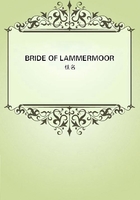
第74章
Here is a father now, Will truck his daughter for a foreign venture, Make her the stop-gap to some canker'd feud, Or fling her o'er, like Jonah, to the fishes, To appease the sea at highest.
Anonymous.
THE Lord Keeper opened his discourse with an appearance of unconcern, marking, however, very carefully, the effect of his communication upon young Ravenswood.
"You are aware," he said, "my young friend, that suspicion is the natural vice of our unsettled times, and exposes the best and wisest of us to the imposition of artful rascals. If I had been disposed to listen to such the other day, or even if I had been the wily politicians which you have been taught to believe me, you, Master of Ravenswood, instead of being at freedom, and with fully liberty to solicit and act against me as you please, in defence of what you suppose to be your rights, would have been in the Castle of Edinburgh, or some other state prison; or, if you had escaped that destiny, it must have been by flight to a foreign country, and at the risk of a sentence of fugitation.""My Lord Keeper," said the Master, "I think you would not jest on such a subject; yet it seems impossible you can be in earnest.""Innocence," said the Lord Keeper, "is also confident, and sometimes, though very excusably, presumptuously so.""I do not understand," said Ravenswood, "how a consciouness of innocence can be, in any case, accounted presumtuous.""Imprudent, at least, it may be called," said Sir William Ashton, "since it is apt to lead us into the mistake of supposeing that sufficiently evident to others of which, in fact, we are only conscious ourselves. I have known a rogue, for this very reason, make a better defence than an innocent man could have done in the same circumstances of suspicion. Having no consciousness of innocence to support him, such a fellow applies himself to all the advantages which the law will afford him, and sometimes--if his counsel be men of talent--succeeds in compelling his judges to receive him as innocent. I remember the celebrated case of Sir Coolie Condiddle of Condiddle, who was tried for theft under trust, of which all the world knew him guilty, and yet was not only acquitted, but lived to sit in judgment on honester folk.""Allow me to beg you will return to the point," said the Master;"you seemed to say that I had suffered under some suspicion.""Suspicion, Master! Ay, truly, and I can show you the proofs of it; if I happen only to have them with me. Here, Lockhard." His attendant came. "Fetch me the little private mail with the padlocks, that I recommended to your particular charge, d'ye hear?""Yes, my lord." Lockhard vanished; and the Keeper continued, as if half speaking to himself.
"I think the papers are with me--I think so, for, as I was to be in this country, it was natural for me to bring them with me. Ihave them, however, at Ravenswood Castle, that I am sure; so perhaps you might condescend----"Here Lockhard entered, and put the leathern scrutoire, or mail-box, into his hands. The Keeper produced one or two papers, respecting the information laid before the privy council concerning the riot, as it was termed, at the funeral of Allan Lord Ravenswood, and the active share he had himself taken in quashing the proceedings against the Master. These documents had been selected with care, so as to irritate the natural curiosity of Ravenswood upon such a subject, without gratifying it, yet to show that Sir William Ashton had acted upon that trying occasion the part of an advocate and peacemaker betwixt him and the jealous authorities of the day. Having furnished his host with such subjects for examination, the Lord Keeper went to the breakfast-table, and entered into light conversation, addressed partly to old Caleb, whose resentment against the usurper of the Castle of Ravenswood began to be softened by his familiarity, and partly to his daughter.
After perusing these papers, the Master of Ravenswood remained for a minute or two with his hand pressed against his brow, in deep and profound meditation. He then again ran his eye hastily over the papers, as if desirous of discovering in them some deep purpose, or some mark of fabrication, which had escaped him at first perusal. Apparently the second reading confirmed the opinion which had pressed upon him at the first, for he started from the stone bench on which he was sitting, and, going to the Lord Keeper, took his hand, and, strongly pressing it, asked his pardon repeatedly for the injustice he had done him, when it appeared he was experiencing, at his hands, the benefit of protection to his person and vindication to his character.
The statesman received these acknowledgments at first with well-feigned surprise, and then with an affectation of frank cordiality. The tears began already to start from Lucy's blue eyes at viewing this unexpected and moving scene. To see the Master, late so haughty and reserved, and whom she had always supposed the injured person, supplicating her father for forgiveness, was a change at once surprising, flattering, and affecting.